Answered step by step
Verified Expert Solution
Question
1 Approved Answer
Question 2 Using Curro as the basis for your answer, critically discuss the process the organisation used in acquiring acquisition target. In addition, discuss the
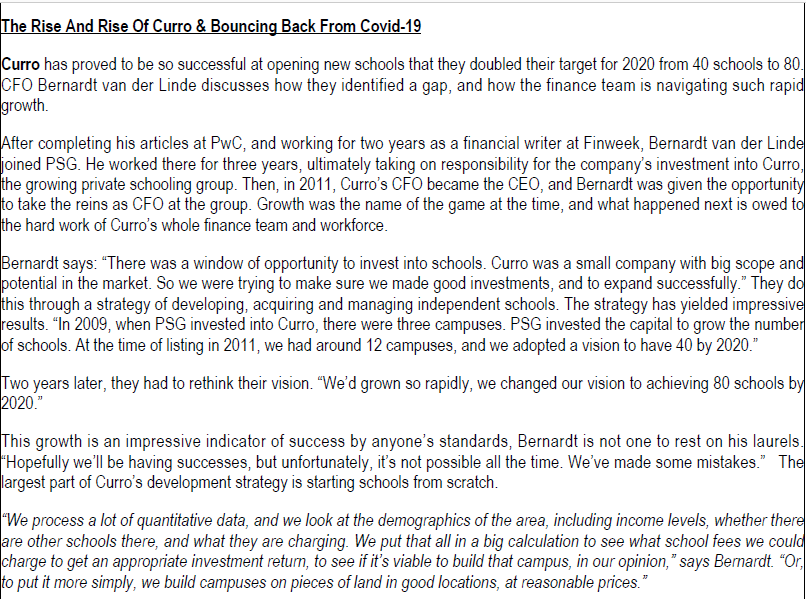
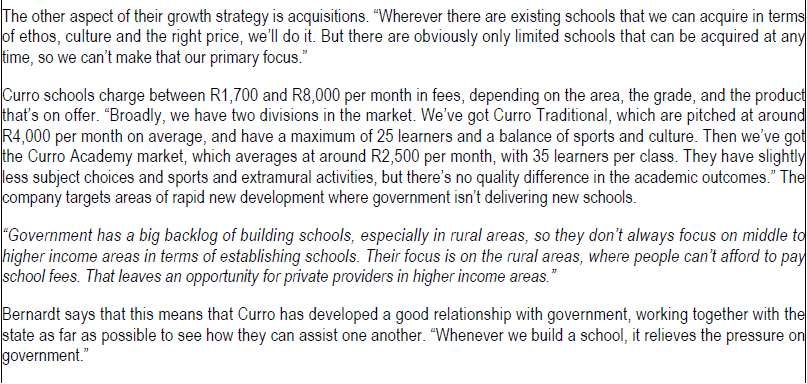
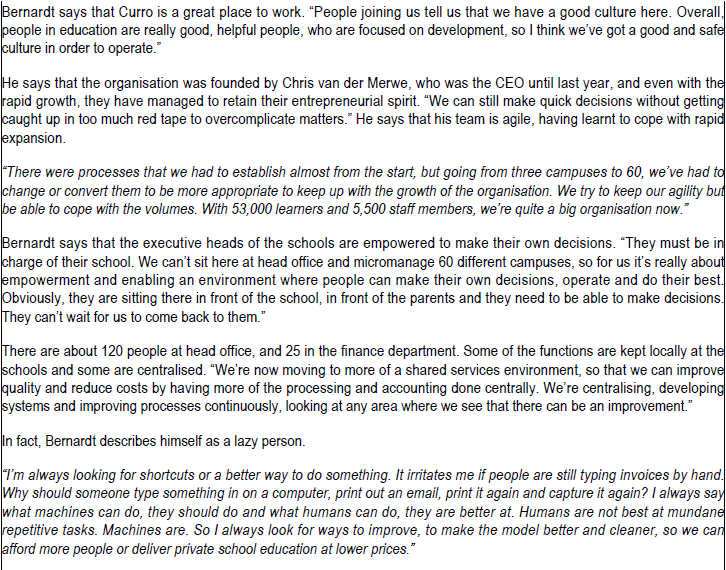
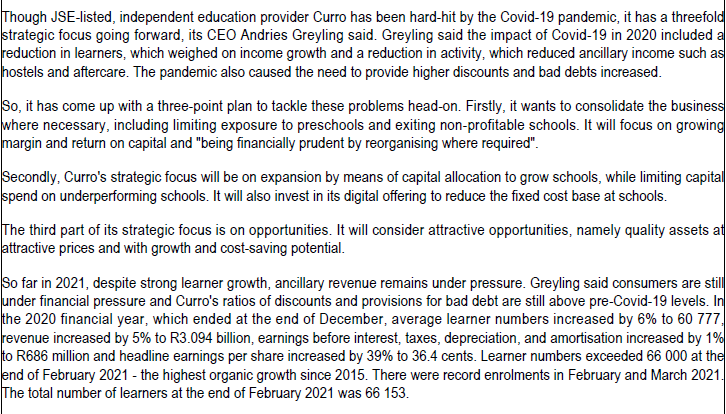
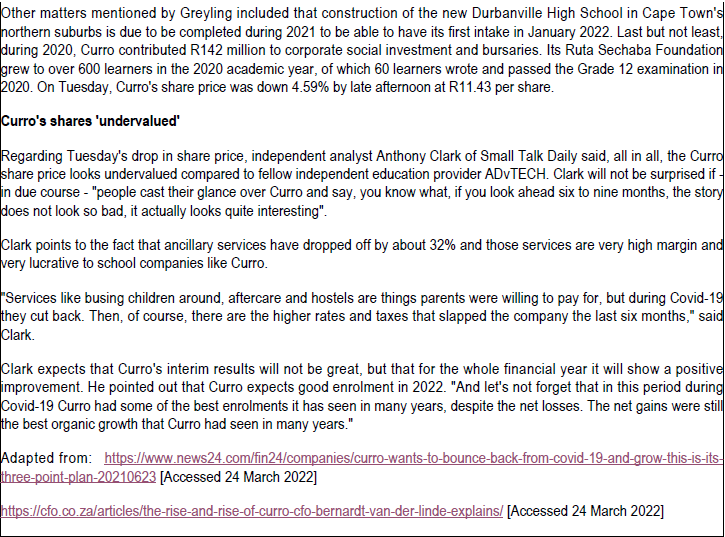
Question 2 Using Curro as the basis for your answer, critically discuss the process the organisation used in acquiring acquisition target. In addition, discuss the key issues that should be in place to ensure success of the acquisition.
Please provide answer in 2000 words.
Curro has proved to be so successful at opening new schools that they doubled their target for 2020 from 40 schools to 80 . CFO Bernardt van der Linde discusses how they identified a gap, and how the finance team is navigating such rapid growth. After completing his articles at PwC, and working for two years as a financial writer at Finweek, Bernardt van der Linde joined PSG. He worked there for three years, ultimately taking on responsibility for the company's investment into Curro, the growing private schooling group. Then, in 2011, Curro's CFO became the CEO, and Bernardt was given the opportunity to take the reins as CFO at the group. Growth was the name of the game at the time, and what happened next is owed to the hard work of Curro's whole finance team and workforce. Bernardt says: "There was a window of opportunity to invest into schools. Curro was a small company with big scope and potential in the market. So we were trying to make sure we made good investments, and to expand successfully." They do this through a strategy of developing, acquiring and managing independent schools. The strategy has yielded impressive results. "In 2009, when PSG invested into Curro, there were three campuses. PSG invested the capital to grow the number of schools. At the time of listing in 2011, we had around 12 campuses, and we adopted a vision to have 40 by 2020." Two years later, they had to rethink their vision. "We'd grown so rapidly, we changed our vision to achieving 80 schools by 2020. This growth is an impressive indicator of success by anyone's standards, Bernardt is not one to rest on his laurels. "Hopefully we'll be having successes, but unfortunately, it's not possible all the time. We've made some mistakes." The largest part of Curro's development strategy is starting schools from scratch. "We process a lot of quantitative data, and we look at the demographics of the area, including income levels, whether there are other schools there, and what they are charging. We put that all in a big calculation to see what school fees we could charge to get an appropriate investment return, to see if it's viable to build that campus, in our opinion, " says Bernardt. "Or, to put it more simply, we build campuses on pieces of land in good locations, at reasonable prices." The other aspect of their growth strategy is acquisitions. "Wherever there are existing schools that we can acquire in terms of ethos, culture and the right price, we'll do it. But there are obviously only limited schools that can be acquired at any time, so we can't make that our primary focus." Curro schools charge between R1,700 and R8,000 per month in fees, depending on the area, the grade, and the product that's on offer. "Broadly, we have two divisions in the market. We've got Curro Traditional, which are pitched at around R4,000 per month on average, and have a maximum of 25 learners and a balance of sports and culture. Then we've got the Curro Academy market, which averages at around R2,500 per month, with 35 learners per class. They have slightly less subject choices and sports and extramural activities, but there's no quality difference in the academic outcomes." The company targets areas of rapid new development where government isn't delivering new schools. "Government has a big backlog of building schools, especially in rural areas, so they don't always focus on middle to higher income areas in terms of establishing schools. Their focus is on the rural areas, where people can't afford to pay school fees. That leaves an opportunity for private providers in higher income areas." Bernardt says that this means that Curro has developed a good relationship with government, working together with the state as far as possible to see how they can assist one another. "Whenever we build a school, it relieves the pressure on government." Bernardt says that Curro is a great place to work. "People joining us tell us that we have a good culture here. Overall, people in education are really good, helpful people, who are focused on development, so I think we've got a good and safe culture in order to operate." He says that the organisation was founded by Chris van der Merwe, who was the CEO until last year, and even with the rapid growth, they have managed to retain their entrepreneurial spirit. "We can still make quick decisions without getting caught up in too much red tape to overcomplicate matters." He says that his team is agile, having learnt to cope with rapid expansion. "There were processes that we had to establish almost from the start, but going from three campuses to 60, we've had to change or convert them to be more appropriate to keep up with the growth of the organisation. We try to keep our agility but be able to cope with the volumes. With 53,000 learners and 5,500 staff members, we're quite a big organisation now." charge of their school. We can't sit here at head office and micromanage 60 different campuses, so for us it's really about empowerment and enabling an environment where people can make their own decisions, operate and do their best. Obviously, they are sitting there in front of the school, in front of the parents and they need to be able to make decisions. They can't wait for us to come back to them." There are about 120 people at head office, and 25 in the finance department. Some of the functions are kept locally at the schools and some are centralised. "We're now moving to more of a shared services environment, so that we can improve quality and reduce costs by having more of the processing and accounting done centrally. We're centralising, developing systems and improving processes continuously, looking at any area where we see that there can be an improvement." In fact, Bernardt describes himself as a lazy person. I'm always looking for shortcuts or a better way to do something. It irritates me if people are still typing invoices by hand. Why should someone type something in on a computer, print out an email, print it again and capture it again? I always say what machines can do, they should do and what humans can do, they are better at. Humans are not best at mundane repetitive tasks. Machines are. So I always look for ways to improve, to make the model better and cleaner, so we can afford more people or deliver private school education at lower prices." Though JSE-listed, independent education provider Curro has been hard-hit by the Covid- 19 pandemic, it has a threefold strategic focus going forward, its CEO Andries Greyling said. Greyling said the impact of Covid- 19 in 2020 included a reduction in learners, which weighed on income growth and a reduction in activity, which reduced ancillary income such as hostels and aftercare. The pandemic also caused the need to provide higher discounts and bad debts increased. So, it has come up with a three-point plan to tackle these problems head-on. Firstly, it wants to consolidate the business where necessary, including limiting exposure to preschools and exiting non-profitable schools. It will focus on growing margin and return on capital and "being financially prudent by reorganising where required". Secondly, Curro's strategic focus will be on expansion by means of capital allocation to grow schools, while limiting capital spend on underperforming schools. It will also invest in its digital offering to reduce the fixed cost base at schools. The third part of its strategic focus is on opportunities. It will consider attractive opportunities, namely quality assets at attractive prices and with growth and cost-saving potential. So far in 2021, despite strong learner growth, ancillary revenue remains under pressure. Greyling said consumers are still under financial pressure and Curro's ratios of discounts and provisions for bad debt are still above pre-Covid- 19 levels. In the 2020 financial year, which ended at the end of December, average learner numbers increased by 6% to 60777 , revenue increased by 5% to R3.094 billion, earnings before interest, taxes, depreciation, and amortisation increased by 1% to R686 million and headline earnings per share increased by 39% to 36.4 cents. Learner numbers exceeded 66000 at the end of February 2021 - the highest organic growth since 2015. There were record enrolments in February and March 2021. The total number of learners at the end of February 2021 was 66153. Other matters mentioned by Greyling included that construction of the new Durbanville High School in Cape Town's northern suburbs is due to be completed during 2021 to be able to have its first intake in January 2022. Last but not least, during 2020, Curro contributed R142 million to corporate social investment and bursaries. Its Ruta Sechaba Foundation grew to over 600 learners in the 2020 academic year, of which 60 learners wrote and passed the Grade 12 examination in 2020. On Tuesday, Curro's share price was down 4.59% by late afternoon at R11.43 per share. Curro's shares 'undervalued' Regarding Tuesday's drop in share price, independent analyst Anthony Clark of Small Talk Daily said, all in all, the Curro share price looks undervalued compared to fellow independent education provider ADvTECH. Clark will not be surprised if in due course - "people cast their glance over Curro and say, you know what, if you look ahead six to nine months, the story does not look so bad, it actually looks quite interesting". Clark points to the fact that ancillary services have dropped off by about 32% and those services are very high margin and very lucrative to school companies like Curro. -Services like busing children around, aftercare and hostels are things parents were willing to pay for, but during Covid-19 they cut back. Then, of course, there are the higher rates and taxes that slapped the company the last six months," said Clark. Clark expects that Curro's interim results will not be great, but that for the whole financial year it will show a positive improvement. He pointed out that Curro expects good enrolment in 2022. "And let's not forget that in this period during Covid-19 Curro had some of the best enrolments it has seen in many years, despite the net losses. The net gains were still the best organic growth that Curro had seen in many years." Adapted from: https://www.news24.com/fin24/companies/curro-wants-to-bounce-back-from-covid-19-and-grow-this-is-itsthree-point-plan-20210623 [Accessed 24 March 2022] https://cfo.co.za/articles/the-rise-and-rise-of-curro-cfo-bernardt-van-der-linde-explains/ [Accessed 24 March 2022]Step by Step Solution
There are 3 Steps involved in it
Step: 1

Get Instant Access to Expert-Tailored Solutions
See step-by-step solutions with expert insights and AI powered tools for academic success
Step: 2

Step: 3

Ace Your Homework with AI
Get the answers you need in no time with our AI-driven, step-by-step assistance
Get Started


